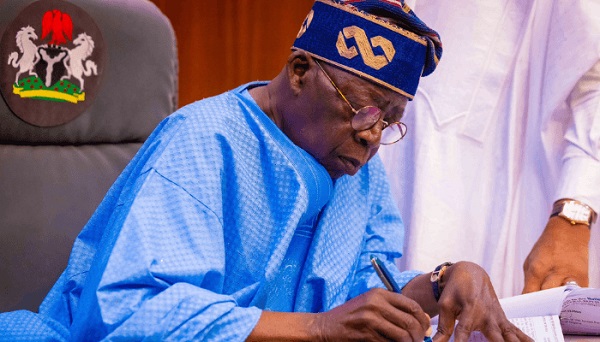President Tinubu outlined plans for addressing persistent challenges in the education sector by implementing a more sustainable model for funding tertiary education.
This initiative includes the introduction of the Student Loan Scheme, set to be operational by January 2024.
Highlighting the importance of a stable macro-economic environment, President Tinubu emphasized its crucial role in catalyzing private investment and fostering accelerated economic growth.
Consequently, his administration will persist in implementing business and investment-friendly measures to ensure sustainable growth.
President Tinubu expressed optimism, anticipating a minimum economic growth of 3.76 percent, surpassing the projected world average. Furthermore, measures are in place to moderate inflation to 21.4 percent in 2024.
In shaping the 2024 Budget, the overarching goal has been to sustain a robust foundation for long-term economic development.
A central focus of both the budget and the medium-term expenditure framework is Nigeria’s commitment to a greener future, underscoring the importance of environmental sustainability in the country’s developmental trajectory.
“Highlighting the significance of public-private collaborations, we have strategically incorporated provisions to harness private capital for substantial infrastructure projects in vital sectors such as energy and transportation.
This strategic move signifies a pivotal advancement in diversifying our energy sources, enhancing operational efficiency, and fostering the growth of renewable energy alternatives.
Through allocating resources to support innovative and eco-friendly initiatives, our aim is to position Nigeria as a regional leader in the global movement towards clean and sustainable energy.
Regarding climate action, with the approaching COP28 climate summit, a critical juncture for global efforts, I have directed relevant government agencies to diligently work towards securing substantial funding commitments.
This financial support is integral to bolstering Nigeria’s energy transition and aligning with our national goals. Seizing this opportunity, we must actively engage with international partners and investors, showcasing the strides we’ve made in creating an enabling environment for sustainable energy projects.
I urge our representatives to proactively engage in discussions at COP28, demonstrating the progress we’ve achieved in fostering a conducive environment for sustainable energy projects. Together, let us strive to emerge from COP28 with tangible commitments, reinforcing our unwavering dedication to a future where energy not only catalyzes development but also serves as a driver of environmental stewardship,” President Tinubu expressed.
Oil price
President Tinubu outlined key aspects of the 2024 Appropriation Bill, citing a conservative oil price benchmark of $77.96 per barrel and a daily oil production estimate of 1.78 million barrels per day. Additionally, he indicated the adoption of a Naira to U.S. Dollar exchange rate of 750 naira per U.S. Dollar for the fiscal year.
Breaking down the budget, President Tinubu proposed an aggregate expenditure of 27.5 trillion naira for the Federal Government in 2024.
Within this, non-debt recurrent expenditure is set at 9.92 trillion naira, debt service at 8.25 trillion naira, and capital expenditure at 8.7 trillion naira. The President affirmed Nigeria’s commitment to meeting its debt obligations, with projected debt service accounting for 45% of the expected total revenue.
The budget deficit for 2024 is projected at 9.18 trillion naira, equivalent to 3.88% of GDP, representing a decrease from the 13.78 trillion naira deficit recorded in 2023.
Financing the deficit will involve new borrowings totaling 7.83 trillion naira, 298.49 billion naira from Privatization Proceeds, and a drawdown of 1.05 trillion naira on multilateral and bilateral loans secured for specific development projects.
President Tinubu reiterated the administration’s commitment to broad-based and shared economic prosperity, announcing a review of social investment programs to enhance their implementation and effectiveness.
Notably, the National Social Safety Net project will be expanded to offer targeted cash transfers to poor and vulnerable households. Efforts to contain financial leakages will also be intensified through the effective implementation of key public financial management reforms.
